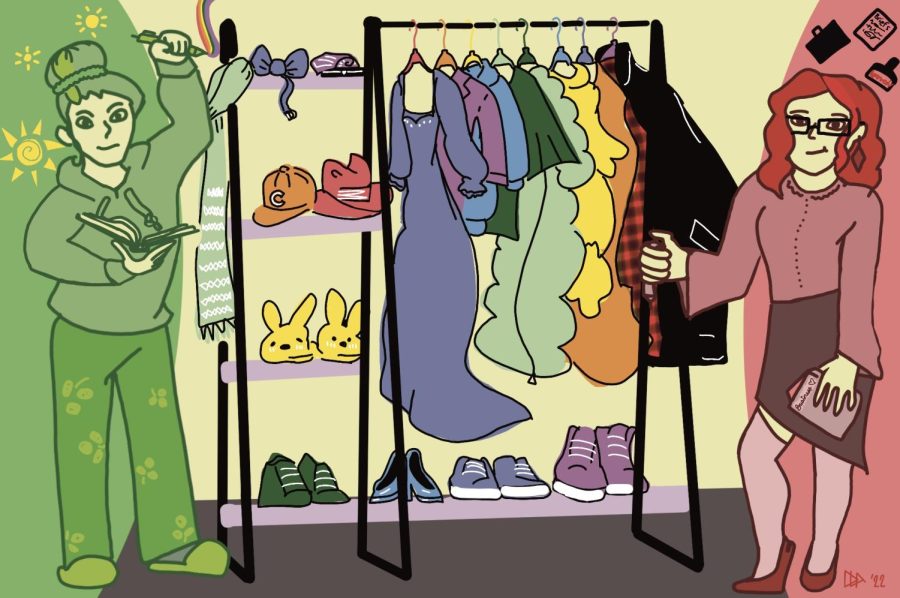Fashion can influence state of mind
Fashion styles and choices can influence our mood. Colors, textures and accessories all come into play to effect our mind.
March 31, 2022
Everyone knows that feeling when you put on a nice suit or fancy dress and feel sharper. There’s a power that we feel when wearing the right outfit. The act of getting up, getting dressed, and the clothes that you wear can have a major impact on your mental state.
It is called enclothed cognition, the influence that clothes have on a person’s state of mind, as defined by Northwestern University.
Dark oversized baggy clothes are linked to depression while bright colors, a dress and jewelry give the impression of happiness and positivity.
When preparing for an interview it is advised to avoid bright colors and patterns and to wear solid neutral colors like grays, dark blues, or blacks. Sticking to the neutrals helps to create a calm, trusting, and logical impression.
One color to be careful with is red, the power color. It conveys passion and emotion, so throwing in a pair of red shoes or a scarf can help express it, as advised by North Little Rock.
The last job interview I attended in person was back in 2019. I was told not to worry about dressing up and to just be comfortable. But I decided to show I had put some effort into my outfit for the meeting. I wore solid black pants and a solid maroon long-sleeved shirt with nice tennis shoes.
The act of dressing up a bit nicer than usual made me feel more prepared for the interview, confident. I felt clean, put together, and ready to impress. I even dress up more than usual when I conduct an interview for the article I am working on at the time.
I urge everyone to put thought into what they wear to their next interview for a job, scholarship, etc.
Dressing to impress others is the power clothes have over others, but there is research to support the impact they have on ourselves.
In 2012, Adam Galinsky and Hajo Adam at Northwestern University conducted a study on enclothed cognition. They believed that lab coats are associated with attentiveness and carefulness, so they were curious if wearing them would improve individuals’ performance.
The study showed, “participants who wore a lab coat displayed increased selective attention compared to participants who wore their regular clothes… there seems to be something special about the physical experience of wearing a piece of clothing, and this experience constitutes a critical component of enclothed cognition.”
When we see a doctor in a lab coat or a nurse in scrubs they appear more credible to those they are servicing. We associate certain types of clothing with particular ideas and this can come in handy in the workforce.
The attire you choose to wear also aids in the expression of oneself. You have the ability to wear colors that reflect how you feel and communicate your personal style.
Freshman business major AJ Delgado is minoring in fashion merchandising and plans to open her own cosmetic or fashion line. Growing up, Delgado began to find herself in fashion.
“It helped me find my identity and who I was,” Delgado said. “Clothing has always been really emotional to me, even at a young age, as silly as that sounds.”
It is important to start your days by making time to take care of yourself and wear clothes that make you feel good about yourself and comfortable.
“Even when I feel groggy before an early class, I put on my face and put my hair up. I think putting on clothing that makes you feel comfortable really improves your mental health,” Delgado said. “The clothes that make you feel bummy or just uncomfortable with yourself will really take a toll on you.”







